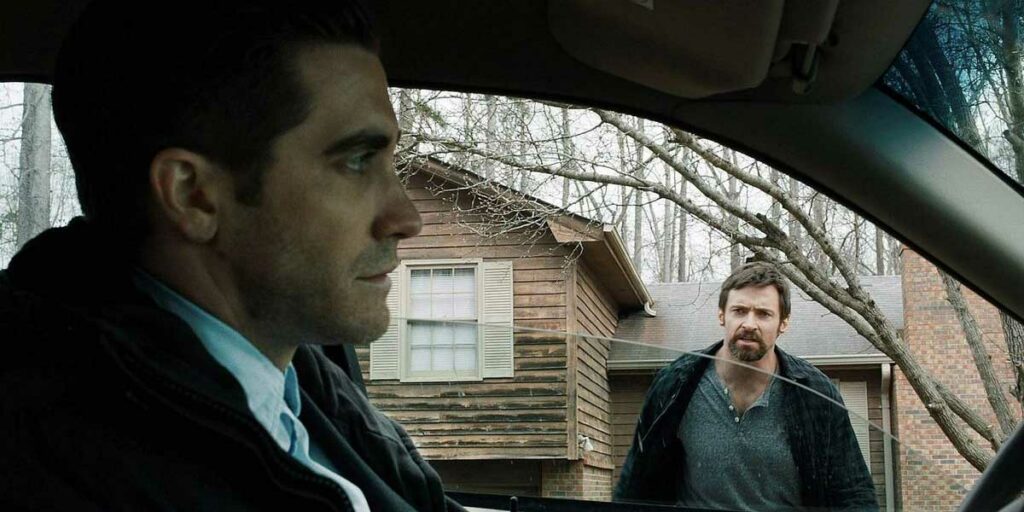Prisoners is a perfect film from Denis Villeneuve. Stellar acting, cinematography, and storytelling help this bleak film stand out among other crime thrillers.
This analysis contains spoilers for the film ‘Prisoners’.
“No one took them. Nothing happened. They’re just gone.” This quote perfectly summarizes the feeling viewers have while watching Denis Villeneuve’s Prisoners, a crime thriller about the tormenting experience of kidnapping. Every scene promises progress on a difficult case, but still feels hopeless, almost as if the main characters’ actions are invisible.
Prisoners conducts a surprising study of religion, a father’s desperation to protect his family and find his daughter, and a detective’s confrontation with the schemes of evil people. This is not a film for the faint of heart, but the payoff is worth it. Prisoners delivers in every facet of filmmaking: the acting, led by the phenomenal Hugh Jackman and Jake Gyllenhaal, is only bolstered by Roger Deakins’ Oscar-nominated cinematography, an entrancing screenplay, and a satisfactory plot twist.
The film opens with Keller Dover (Hugh Jackman) reciting The Lord’s Prayer while his son trains his rifle on an unsuspecting deer. “Amen,” Keller says, as Ralph (Dylan Minnette) pulls the trigger. The Dovers spend Thanksgiving down the street from their house with close family friends, the Birches; that afternoon, Anna Dover (Erin Gerasimovich) and Eliza Birch (Zoë Soul) disappear in broad daylight.
The next two hours of screen time unfold an intricate plot. Prisoners is a stellar mystery, pulling the viewer in all directions, until it finally reveals the kidnapping killer as one they would least expect. One of the best parts of this film is how well-constructed the story is. That the prime suspects, two battered souls, are past victims of Holly Jones, is a grueling reveal. Villeneuve carefully leaves clues from beginning to end, giving us as viewers the challenge of solving the crime before Detective Loki (Jake Gyllenhaal) does.
The plotline involving Alex Jones (Paul Dano) is a dark, yet profound aspect of the film. Alex is the first main suspect for a good portion of it, though in the end he is perhaps the most harmed victim. Because he “has the mind of a 10-year-old,” as Detective Loki claims, he won’t confess or deny any allegations. Keller is determined that Alex kidnapped his daughter, and resolves to make him confess. What ensues is tragic; the brutal torture of a man once kidnapped by the true criminal reveals that Keller’s religion won’t stop him from doing unthinkable things to find his daughter. It’s highly unsettling. We may get moral whiplash trying to reconcile whether Keller’s actions were justified. Viewers, especially those with kids, are confronted with introspection: would we do the same?

The first sign of a plot deeper than a spontaneous kidnapping comes when Loki goes to question the local priest. He finds him passed out drunk—another slight against religion—and discovers a dead body under the house wearing a circular, maze-like necklace. (When I saw this I wondered if the film would foray into the occult or a secret society of sorts; a solid misdirect from Villeneuve.) The now iconic maze turns out to be a sick game the kidnapper would force her victims to play. If they solve it, they can leave.
When Detective Loki questions Bob Taylor (David Dastmalchian) at his front door, the meaning of the maze symbol only gets more cryptic. This scene between Loki and Bob is a showcase for both actors’ skill, and surely an iconic moment from the film. Meanwhile, Keller keeps torturing Alex. As the self-perceived arbiter of justice (because Loki has failed to find the kidnapper), Keller wastes away with conflicting morals and a longing to find his daughter. The chemistry between Jackman and Gyllenhaal is perfect; their scenes bring incredible tension and emotion.
The plot still subverts expectations, as Holly Jones reveals she and her husband were Christians until they lost their son to cancer. As a result, they lost their faith, kidnapped Alex to fill their void, and kept kidnapping thereafter. As Holly captures Keller, she makes a coldblooded claim: “Making them disappear is the war we wage with God. It makes them lose faith. Turns them into demons like you.” She then leaves Keller in a pit to die—which becomes the cliffhanger of the film. Prisoners is unforgiving, but it is one of the most well-made films from Villeneuve.
In the 10 years since its release, Prisoners has become a staple crime thriller. It offers everything from high class filmmaking to career-defining performances, but better than its counterparts, it relentlessly studies the impact kidnapping has on the various people involved. Every performance is, tragically, convincing. Prisoners marked yet another perfect movie from director Denis Villeneuve, solidifying his place as one of the greatest and most dynamic directors in modern cinema.
Prisoners is now available to watch on digital and on demand.

